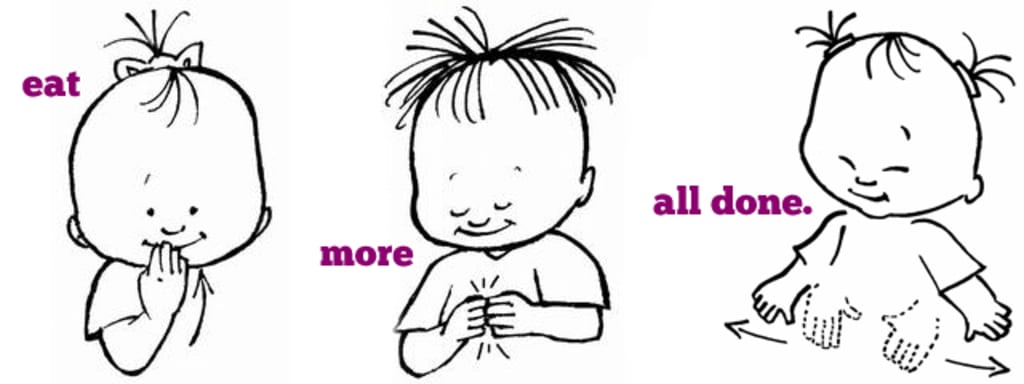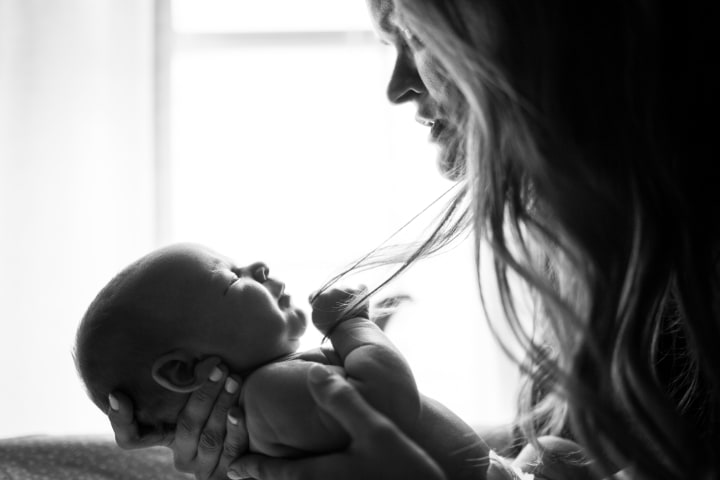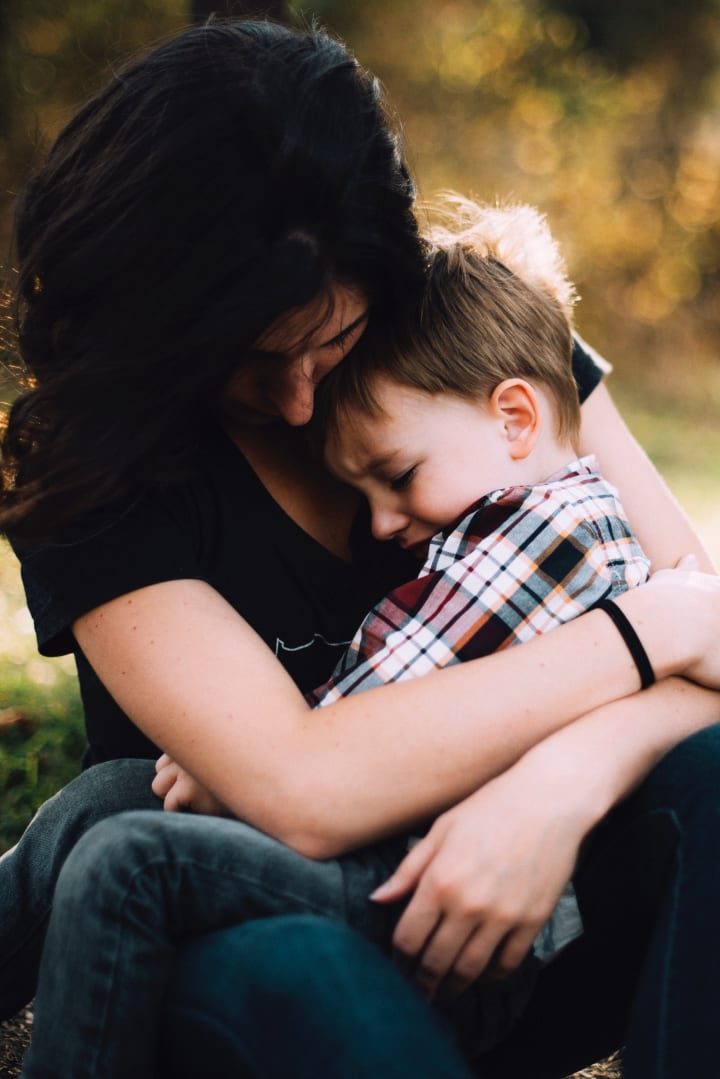Sign Language
Teaching Infants and Toddlers to Communicate, and Express Themselves, Through Basic Signs

One of the most stressful things as parenting, and in childcare in general, is having an infant or toddler crying out in frustration, and not knowing what they want or need. They get frustrated because they cannot communicate their need to you, and you get frustrated because you can not satisfy that need. Not being able to communicate with babies and nonverbal toddlers can feel defeating, and you can feel like you're failing as a caregiver, but teaching them sign language can help.
In this post I will be talking about how sign language helped me tremendously as a parent. How we use, and teach signs, in my classroom, the benefits of teaching signs to your infant or toddler, and the negative (if there is any), as well as going over some of the basics sign for you to teach your kiddos. With any topic that deals with delayments, disabilities, teaching methods, etc, I want to put out a disclaimer. I am not an expert. I am not a doctor, I am not a therapist, and so on. I am a infant/toddler teacher, and I am a mother. I can only tell you my opinion, my experiences on the topic, and what has, or hasn't, worked out for me.
My Story...

Photo by Zach Lucero on Unsplash
One of the topics I will probably share often, and speak about, is my own son, and his delayment in speech. Although it was difficult at the time, I am glad to have gone through that experience as a parent. I know what it's like to be worried about their child being behind. I know what it's like to feel defeated, and not knowing what to do. I know what steps I took to receive help. I know that there is a light at the end of the tunnel. And I can share that information with parents that are going through the same thing. Sign language was a godsend during this time... and I am going to share a bit of what I went through with you.
As a first time parent I didn't fully know what all the milestones in children's development are (lets just say, I know a lot more now). But I did my best trying to look things up, and to talk to my child's pediatrician about what he should be doing, and when... but I often felt very much in the dark. When I started working in childcare, my son was approximately 12 months old. I also went back to college to finish my degree around the same time, and that's when I started really learning about children's development... and I started to see it. I started to see that he wasn't where he was suppose to be, but I also knew that children develop at different rates, and I tried not to be too concerned. However, I immediately got him signed up on the waiting list to the center I was now employed at. I wanted someone else's opinion, I wanted him around other children and see if he would open up... I just wanted to do everything right, and give him everything he needed to be successful.
When he got in (aprox. 15 months), his only form of communicating with us, was screaming, or grunting while pointing at something he wanted. I knew then that he should of have some words down, "mine, ball, blankie," etc. But nothing, even his once used words of "momma" and "dadda" were getting lost. It was then that I started using signs. I learned this once starting at the center. I saw them using sign, particularly at meal times in the infant room, and I saw the babies signing back. So I informed my husband, and we implemented it at home as well. I didn't take long for him to pick it up, and things got a little bit easier. When he wanted food, he'd signed, "eat", wanted more, he signed. You get the point.
When he hit 24 months old, and the 15 month kids in my room spoke more than him, I got even more concerned.. so I sought help. I thought maybe I was too late...but you are never too late to teach or learn something.
When he was almost two 1/2 years. He would still say very little, but we did have words, a few words and a lot of babble (a big improvement). He was then taking speech with a speech therapist, and we found out that if he knew the sign to the word, he would be more likely to use the word, and implement it during play and other interactions instead of babbling. So mommy learned more words, and we used them. Now, he's in preschool. He is still in speech, but he nonstop talks (or I should say, he talks mommy's head off, but at school he is still quiet and shy).
And we still sign!
Signing in Our Classroom

Signing "More"
As I previously mentioned, signing starts in the infant rooms at meal times. The teachers in those room will tell kids when it is time to eat, and will sign it to them, before putting them in their highchairs and giving them their food. When they seem uninterested in their meal, and begin to fuss, the teachers ask, "Do you want more?" and they sign more. After giving them more, and the children still seem uninterested in it, then they will ask, "Are you all done?' and they will sign it to the babies before getting them out of their highchairs.
We start doing this to infants around five month old, although they don't have the physical development to do it back yet. They do take in the information though, they will pick up that when you ask "more" that they get more food, and "all done" means that they are finished. And they pick up on the back and fourth communication that is going on between you and them. Around 7-8 months, they can start signing, although their hand and finger movements will most likely start off a little stiff until they develop their motor skills, but you'll get the just of what they are trying to say.
By the time they get to my room, which is usually 12-24 months, they have those basic signs down, and at meal times, we start adding some manners, daily routines, and building on even more vocabulary.
A child signs more, and we will ask, "say, please" and we will sign it to them. They are more opt to imitate actions and words at this time of age, and once they do it, and we give them more, then they will continue using it. Once giving them food, we will also say, "Say, thank you" and sign it, to show them how they should respond back after we give them something that they wanted.
We also show them, and encourage them to sign and say, "mine" when a another child tries to take an object from them. "Sorry" if they hurt, or took a toy from, another child. For daily routines we use "potty" when we do diaper changes, "wash" for when it is time to wash our hands, etc. We also build upon their language, and sign as we sing, read stories, talk about colors, animals, other objects in our room, or other daily activities that we do throughout the day.
Benefits of Using Sign Language

Photo by Jordan Whitt on Unsplash
One day on Facebook, I saw a picture that was shared that showed all the basic signs to teach infants, and I shared it. I posted how grateful I was for knowing this, and how it helped. Then one of my cousins commented on it saying how hurtful it is to teach infants and toddlers to sign, and it will delay them from speaking. I replied back that it did nothing but help in our situation, and that we use it all the time at work. She then commented on it saying that it wasn't her opinion, but a friend of hers, and that this friend was speech therapist, and an expert on the topic. In which my response was like, "Uh, well all of the speech therapists I've worked with encourages it." and I went on to say that I think as long as you still talk to children, and say to them the words you are signing, that they will pick it up. I think it is pretty obvious that is you don't verbally speak, and only sign, then the child will do the same, because that is all they are observing and learning from you. But again I am no expert.
I did look into some cons of teaching sign language, and didn't find much. What I did find, seem more like parents questioning whether it is worth it or not (imo... YES! It is!). That it is just a fad, like how classical music, and baby Einstein was. I also came across an article questioning whether it is bad for the hearing to "steal" sign language from the hearing impaired? In which I thought to myself, "wouldn't it be better if we could communicate to each other?"
I didn't find any actual fact, or reasons not to, but I found several pros, and reasons to teach infants and toddlers basic sign. Which a few are...
2. Since you are communicating and dealing with less meltdowns and tantrums, it is a rewarding and bonding experience to have with children.
3. Learning more than one language can help brain development. So it's not just language they are gaining from it, but so much more, signing can help in
- Multitasking: they are learning to verbally speak and sign together at the same time.
- To sign, babies are encouraged to use their fingers, hands, and arms, which develops their fine and gross motor skills.
- And as they watch you sign, imitate the sign, and then perform the sign to communicate, their cognitive development enhances as well.
4. Studies have shown that learning signs as an infant/toddler will advance language development and those children will have an higher vocabulary by preschool! (BAM!!! take that cousin!)
5. You can use this on any child, no matter where they are at in development, or what delayments or disabilities they have, and they will gain from it.
Light at the End of the Tunnel

Photo by Benjamin Manley on Unsplash
If you are a parent with concerns about your child's speech, I hope this helps in some way or another. Remember, each child develops at their own speed, if your child doesn't talk, it could be for several reasons, they could just be shy... don't be quick to judge and think they have something wrong with them. Be open with their doctor about it. If they are in childcare, talk to their teacher, or your homecare provider, and see what their concerns are. Ask, or look into, what your state, city, and local school agencies can do to help in early development. And if you are still concerned (like I was), call and see if a speech therapist can come out and observe them, and see if they think he/she could gain from speech therapy. And last of all, don't be ashamed. Speech delayment is very common in young children. I too, was delayed as a toddler (like mother, like son, right?)
To help you learn some signs, I encourage you to visit www.babysignlanguage.com
About the Creator
Daycare Momma
I'm a teacher. An infant/toddler teacher to be exact. I wipe little noses. I change poopy diapers. I sing songs. I read stories. I kiss boo-boos. I give cuddles. I teach them ABCs and 123s...and I do so much more.
I am, their daycare momma.






Comments
There are no comments for this story
Be the first to respond and start the conversation.